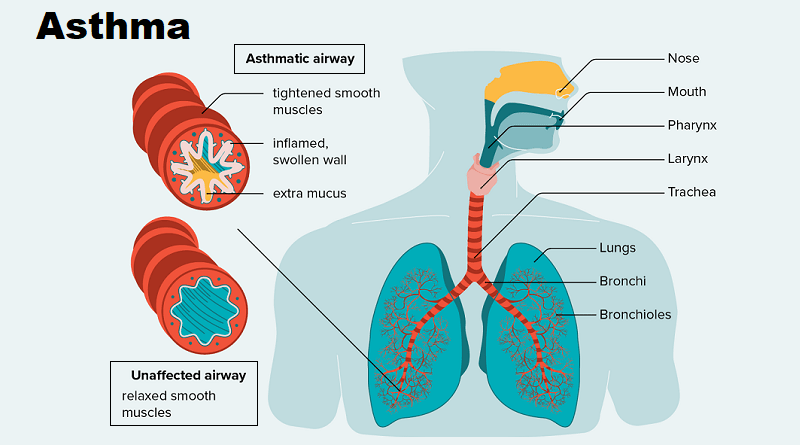Asthma and Its Impact on Your Life
Last Updated on 02/09/2026 by Helal Medical
Asthma is a chronic respiratory condition that affects millions of people worldwide, with a negative impact on their life. It is important to understand its causes, symptoms, and management. In this article, we will explore asthma, its definition, underlying mechanisms, common triggers, and available treatment options. By gaining a comprehensive understanding of asthma, we can reduce its negative impact on our life.
What is Asthma?
Asthma is a chronic respiratory disorder characterized by inflammation and narrowing of the airways. When a person with asthma is exposed to certain triggers, their airways become inflamed, causing them to become swollen and sensitive. This inflammation leads to the production of excess mucus and the constriction of the muscles around the airways, resulting in breathing difficulties.
The Prevalence of Asthma
Asthma is a widespread condition that affects people of all ages, genders, and backgrounds. According to the World Health Organization (WHO), an estimated 235 million people currently suffer from asthma worldwide. The prevalence of asthma varies across different countries and regions, with factors such as genetics, environmental conditions, and lifestyle playing a role in its development.
Common Symptoms
The symptoms of asthma can vary in severity and frequency from person to person. Some of the most common symptoms include:
a) Shortness of breath: Individuals with asthma often experience difficulty breathing, especially during physical exertion or exposure to triggers.
b) Wheezing: Wheezing is a whistling or squeaky sound produced when air flows through narrowed airways. It is a classic symptom of asthma.
c) Coughing: Persistent coughing, particularly at night or in the early morning, is a common sign of asthma. The cough may be dry or accompanied by phlegm.
d) Chest tightness: Asthma can cause a feeling of tightness or pressure in the chest, making it uncomfortable to breathe deeply.
Causes and Triggers
While the exact causes of asthma remain unknown, several factors can contribute to its development. These include:
a) Genetic predisposition: People with a family history of asthma are more likely to develop the condition themselves, suggesting a genetic component.
b) Environmental factors: Exposure to certain allergens (e.g., dust mites, pollen, pet dander), air pollutants, tobacco smoke, and respiratory infections can trigger or worsen asthma symptoms.
c) Occupational triggers: Some individuals may develop asthma or experience worsened symptoms due to exposure to specific substances in their workplace, such as chemicals, dust, or fumes.
Diagnosing Asthma
Proper diagnosis is crucial for effective asthma management. Medical professionals typically employ various tools and tests to diagnose asthma, including medical history evaluations, physical examinations, lung function tests (such as spirometry), and allergy tests. It is essential to consult a healthcare provider if you suspect you may have asthma or are experiencing persistent respiratory symptoms.
Managing Asthma
While asthma cannot be cured, it can be effectively managed to minimize symptoms and improve quality of life. Treatment plans are usually personalized based on the individual’s symptoms, triggers, and severity of the condition. Common approaches to managing asthma include:
a) Medications:
Inhalers and other medications, such as bronchodilators and anti-inflammatory drugs, are commonly prescribed to control symptoms, reduce inflammation, and open up the airways during asthma attacks.
b) Avoiding triggers:
Identifying and avoiding triggers, such as allergens or irritants, is crucial for preventing asthma attacks and reducing symptom severity.
c) Asthma action plan:
Creating a personalized asthma action plan with the guidance of a healthcare professional helps individuals understand their triggers, recognize symptoms, and know how to respond during an asthma attack.
d) Regular check-ups:
Routine visits to healthcare professionals allow for ongoing assessment of asthma control, adjustment of treatment plans, and education on managing the condition effectively.
Summary:
Asthma is a chronic respiratory condition that affects millions of individuals worldwide with a significant impact on them. Asthma is a chronic respiratory condition characterized by inflammation and narrowing of the airways. This article provides insights into the definition, prevalence, symptoms, triggers, and management of asthma. Understanding asthma empowers individuals to effectively manage their condition, reduce symptoms, and lead healthy life.
If you suspect that you may have symptoms, Helalmedical can help, offering quick, private, and convenient testing options. You may contact us here: Facebook page.
Discover more from Helal Medical Manila
Subscribe to get the latest posts sent to your email.




